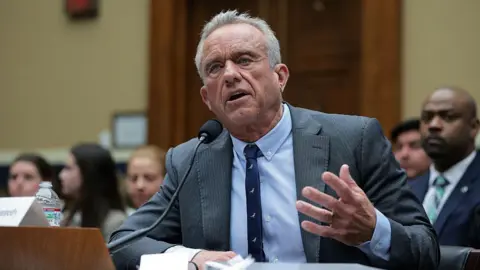RFK Jr's vaccine panel to review long-approved jabs for children
 Getty Images
Getty ImagesThe new members of US Health Secretary Robert F Kennedy Jr's panel of vaccine advisers will review long-approved immunisation schedules for children and teens.
The seven members of the Advisory Committee on Immunization Practices (Acip) met for the first time on Wednesday, weeks after Kennedy ousted all 17 of their predecessors.
The Acip recommends who should be vaccinated and when these immunisations should occur to the US Centers for Disease Control and Prevention (CDC).
Ahead of the meeting, public health experts and politicians raised concerns about the qualifications of the new members - several of whom are vaccine critics.
The health secretary sparked uproar when he removed all of Acip's members on 9 June, and then hand-picked eight new members to serve on the panel - including one who dropped out hours before the first meeting.
Wednesday's meeting began with the new chair Dr Martin Kulldorff telling the panel that he was fired from his job as a professor at Harvard University because he refused to get a Covid-19 vaccine.
Dr Kulldorff also announced the panel would launch new working groups to examine child vaccination schedules and vaccines that were approved seven or more years ago.
He said that whether it was "wise" to give the hepatitis B vaccines to newborns - a shot proven to be safe and effective at preventing the infection that causes liver cancer - would also be reviewed, as would vaccine schedules for measles.
Examining vaccines licensed seven or more years ago raises concerns because it suggests their approval process was flawed, said Bill Hanage, a professor of epidemiology at Harvard TH Chan School of Public Health.
"I cannot think of any rational reason you would look at that and think it to be the case," he said.
The panel was initially meant to vote on recommendations for shots against RSV, a respiratory virus that can be dangerous for infants, but that has been postponed.
On Thursday, the group is scheduled to hear a presentation on the use of thimerosal in vaccines given by Lyn Redwood, a former leader of Children's Health Defense, an anti-vaccine group Kennedy used to run.
Ms Redwood has been hired by the CDC to work in its vaccine safety office, according to the BBC's US partner CBS News.
The decision for the panel to discuss thimerosal - a mercury-based preservative that has not been used in most vaccines for decades - was perplexing, Prof Hanage said.
In the past, he added, Acip's members had a wide range of vaccine expertise and would scrutinise vaccine recommendations for months.
This time, Kennedy chose a panel of "people that are like him - people in the past who have shown an anti-vaccine bias", said Dr Paul Offit, a former Acip member and director of the Vaccine Education Center at the Children's Hospital of Philadelphia.
One of the new Acip members was planned to be Dr Michael Ross - but he withdrew this week ahead of a review of members' financial holdings, the Department of Health and Human Services said.
Kennedy's panel choices have also sparked criticism from Republican Senator Bill Cassidy, a physician who was sceptical of voting to confirm Kennedy as health secretary because of his stance on vaccines.
Cassidy wrote on social media that the panel should not proceed with their meeting because of the group's small size and the lack of a CDC director in place to approve their recommendations.
"Although the appointees to Acip have scientific credentials, many do not have significant experience studying microbiology, epidemiology or immunology," he wrote.
"In particular, some lack experience studying new technologies such as mRNA vaccines, and may even have a preconceived bias against them."
